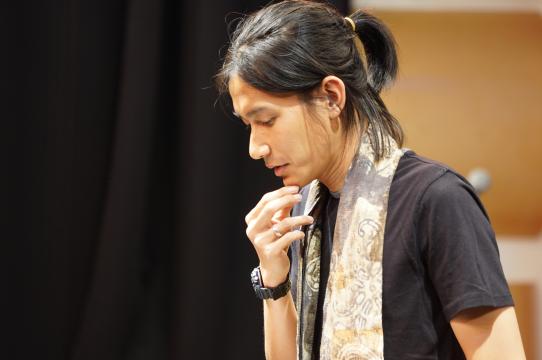Growing up in Indonesia, Jay Afrisando heard his mother singing karaoke almost every day. He partly credits this experience for him becoming a composer and sound artist.
“It’s how I got exposed to music and it allowed me to listen to many different songs she did,” he said. “During elementary school, I also played a recorder and the melodica because those instruments were basically mandatory. Fast forward to six years later, I got into a string ensemble, not in a music university, but in a public university. That’s how I got interested in arranging music and got into the work behind the scenes as a composer.”
Afrisando, a new assistant professor of music at UC Santa Cruz, had been studying computer science at a university in Indonesia, but because of his experience with the ensemble and wanting to be surrounded by others passionate about playing and composing music, he transferred to the Institut Seni Indonesia Yogyakarta, where he got his B.A. in Music Composition.
After earning his B.A. in Indonesia, Afrisando went to the University of Minnesota, where he got his M.A. and his Ph.D. in Music Composition.
That decision turned out pretty well for him. His works have been presented at numerous scenes and institutions, including Sound Scene at Smithsonian Hirshhorn Museum and Sculpture Garden, HERE Arts Center, Walker Art Center’s Virtual Cinema, Aural Diversity Conference at Attenborough Arts Centre, and Linux Audio Conference at Center for Computer Research in Music and Acoustics. The awards he’s won include the MAP Fund 2022, the Jerome Hill Artist Fellowship 2021-22, and the Minnesota Emerging Composer Award 2016.
Afrisando says UC Santa Cruz stood out to him because of their willingness to look at decolonizing art practices, along with his new department’s recognition that people hear differently.
“One of my focuses is aural diversity, which is somewhat a new field that has emerged in the past few years and some universities may not welcome it or deem it important,” he said. “I feel grateful that UCSC Music Department welcomes a field that is so, so important in human life.”
The topic of his dissertation was “Listening is Aural, Visual, and Vibrational: Advancing the Notions of Aural Diversity through Music Composition.”
We listen with more than our ears, Afrisando said, and for the past few years, he’s been looking at the human differences in hearing from D/deafness to cochlear implants to hearing aids to tinnitus to hypersensitivity and hyposensitivity in hearing.
“I consider aural diversity essential for all human beings to understand and to really know about how we all hear differently and to think about our empathetical listening to understand each other and hopefully to create a more inclusive world,” he said. “About five years ago, I got into these questions about how deafness and music relate to each other, like how deaf people hear or listen to music and those questions have led me to learn about aural diversity and differences in hearing.”
Another reason that Afrisando was attracted to UC Santa Cruz was the emphasis on research and on collaboration between departments. He says, along with colleagues in the Music Department, he’s also hoping to work with some other scholars he has admired in other disciplines, including from Anthropology, the Arts Division, Environmental Studies, and History of Consciousness.


